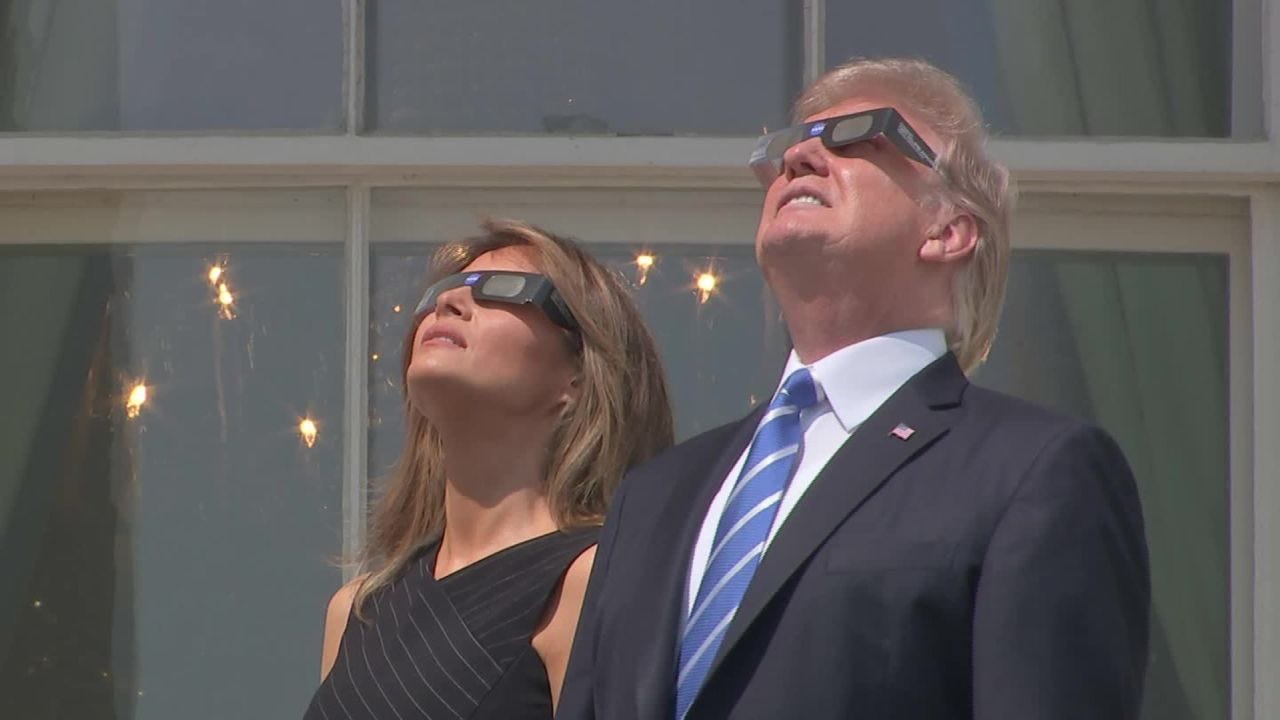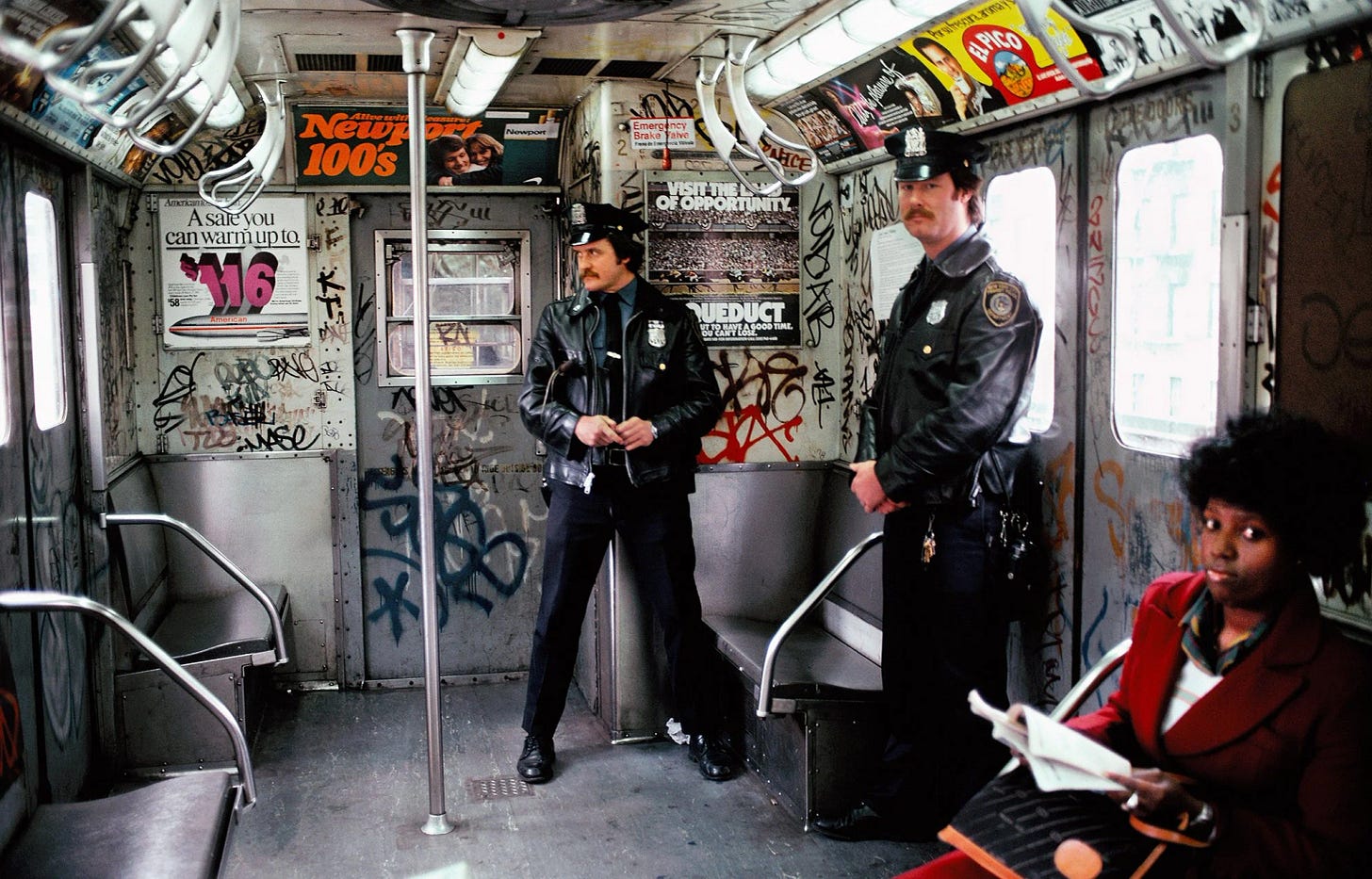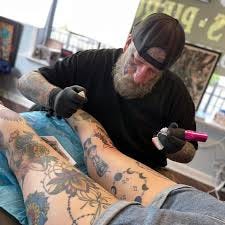Policy proposal: Ending America's tattoo epidemic
National scrubdown
If there’s one thing Trump understands, it’s the power of aesthetics. People act better around beautiful things. They’re more relaxed and make better decisions in the absence of stressors and eyesores. It’s easy to not care about a shithole, while people tend to want to preserve and protect precious things in an often ugly world. Trump has built some of the most beautiful buildings on the planet, and designed some of the most iconic moments in political history. As Trump moves out of the opening phase of his already remarkable second term, I think it’s time for his administration to start focusing on helping the public recover from the aesthetic damage done by America’s preceding decades of social, cultural, and political chaos.
If you go outside, it is impossible to ignore that a lot of people have new tattoos. It’s not just in your head. According to a recent Pew Research Center survey, nearly 33% of American adults today have at least one tattoo, compared to 21% of US adults in 2012 and 16% of adults in 2003. The phenomenon is most common among young people. Nearly 40% of Americans between the ages of 18 and 29 have a tattoo.
I’m sure there are many perfectly understandable explanations for the rise in tattoos: Greatly reduced stigma, increased availability (it seems like every strip center I pass has a new tattoo parlor), general civilizational pessimism, etc., but they don’t matter much. I’m not a sociologist and I don’t really care why this has happened or who is to blame. I have many friends and loved ones with tattoos, I’m not judging. What I do care about are the consequences of this accelerating trend.
The health impacts of tattoos remain largely unstudied despite their growing popularity. Tattoo inks are legally considered cosmetics and are subject to far fewer health and safety regulations than drugs. Tattoo inks do not require FDA testing or pre-approval before being made available to the public. The limited research conducted on popular tattoo inks has revealed that there is a lack of consistency and standardization among inks (suggesting slapshot and dangerous manufacturing conditions) and that these inks sometimes include massive amounts of heavy metals and other dangerous materials, which can and do seep into the bloodstream. Tattoos can contain so much heavy metal that they can interfere with an MRI.
Beyond inflammation, cognition problems, and other negative consequences that accompany heavy metal exposure, the growing popularity of tattoos raises an even more serious concern for Americans: The huge spike in tattoo rates is most noticeable among women. Today more than 50% of women between the ages of 18 to 49 have at least one tattoo. Pregnant women being exposed to heavy metals has a serious impact on their children in the womb, potentially causing major and lifelong developmental problems. Just like with marijuana de-criminalization, the impact of tattoos becoming so commonplace during the last few years will likely be felt for decades in the form of generations of kids with lower IQs and higher rates of developmental disabilities, along with other serious challenges. We’re poisoning future Americans at a mass scale by ending these taboos.
Tattoos are also linked to a number of antisocial behaviors. According to a comprehensive study, men with tattoos were over 2.5 times more likely to be arrested, 1.8 times more likely to be convicted, and twice as likely to be incarcerated compared to men without tattoos. Women with tattoos faced 1.75 times higher odds of being arrested, 1.68 times higher odds of being convicted, and 1.9 times higher odds of being incarcerated compared to women without tattoos. This study is revealing in other ways, namely that criminology and sociology have become hopelessly politicized: The study’s authors suggested that these higher crime/conviction rates were likely due to the stigma associated with having a tattoo, which is frankly very stupid. People with tattoos also use drugs and alcohol at greater rates than the general public. I couldn’t find the statistics to back this up, but I can guarantee you that people with tattoos also have a higher suicide rate and get into traffic accidents more often (not waiting for evidence on this, I know it’s true, prove me wrong).
Do tattoos make people break the law? Does having a tattoo make a person do drugs, commit suicide, or get into traffic accidents? I don’t think so, or at least it’s not that simple. Still, at the same time, I am certain that America could greatly reduce crime, drug use, suicides, and traffic accidents by making tattoos much harder to get and by helping people with tattoos remove them if they want to.
The Broken Windows Theory is a controversial criminology theory first introduced in the 1980s. In essence, the theory states:
Social psychologists and police officers tend to agree that if a window in a building is broken and is left unrepaired, all the rest of the windows will soon be broken. This is as true in nice neighborhoods as in rundown ones. Window-breaking does not necessarily occur on a large scale because some areas are inhabited by determined window-breakers whereas others are populated by window-lovers; rather, one un-repaired broken window is a signal that no one cares, and so breaking more windows costs nothing. (It has always been fun.)
This theory developed into a policing strategy wherein police remove graffiti, take away trash, and aggressively target low level crimes (such as breaking windows) and quality of life misdemeanors (noise violations, littering, vagrancy, etc.) with the idea that increased early and low level interventions would reduce the rates of these and more serious (and difficult to prevent) crimes in the surrounding area. This place is something people care about. Bad things do not happen here. The strategy seems to have worked where it was implemented: People who commit low level crimes commit more serious crimes at far higher rates. Getting low level offenders off the streets not only removes the opportunity for these people to do something worse, it creates a localized climate where all anti-social behavior is more stigmatized and less likely to occur.
The tattoo epidemic is not going to go away on its own. Not only is there the memetic effect of tattoos becoming normalized (reduced stigma encourages more tattoos which produces reduced stigma etc.), but tattoo removal procedures require specialized equipment (tattoo-removal lasers can cost over a hundred thousand dollars), extended periods of time (the threat of blood poisoning or scarring forces procedures to be spaced out over months and years), and many tattoo inks can’t be removed from the body at all without physically removing the skin.
Prices for tattoo removal procedures are exorbitant and unaffordable for most people, it’s often tied to unfavorable financing arrangements. There is a well developed industry designed to extract maximum revenue from people who just want to move on. I was inspired to write this proposal after I went on the tattoo removal Subreddit. It’s just depressing: You get these people who stupidly spend a few hundred dollars on a tattoo years ago, only to be told that it will take them thousands of dollars and several years to have it (and the accompanying stigma and career limitations that obnoxious tattoos have) removed. It’s always easier and cheaper to just get a new tattoo to cover up a problematic one than it is to go tattoo free, which is usually what the people with this problem actually want. Lots of people get stuck with these things for their entire lives. It might prevent them from getting a better job, a spouse, a loan, and ultimately a shot at the kind of life that America is supposed to promise.
Tattoos are like a broken window on a person’s body and society at large. Someone with this problem inevitably encounters many different problems and might cause a few problems for others as well. You can talk about personal responsibility or freedom or whatever, but at the end of the day this is a real issue that is generating real health effects, missed opportunities, injuries, and deaths that affect broader society rather than mere individuals alone. The government has much to gain from repairing these windows and preventing other windows from being broken in the future.
With all this in mind, below are a few steps the government can take right now to address this problem.
Reclassify tattoo inks as drugs and subject them to standard FDA testing and pre-approval practices
It’s a little ridiculous that substances that are designed to be injected into the skin (the body’s largest organ) permanently are treated as mere cosmetics. The burden needs to be shifted to manufacturers to prove that these products are safe for consumers over the long term. I’m not a lawyer, I don’t know how this process works, but the FDA should begin regulating tattoo inks as drugs as soon as possible and create a rebuttable presumption that tattoo inks are unsafe. Requiring (expensive) long-term safety testing would likely take cheap inks made by fly-by-night manufacturers, which pose the most serious risk, off the market entirely. Hopefully this will translate to higher prices for consumers and fewer (or smaller) tattoos.
Prohibit the importation of foreign-manufactured tattoo inks
In order to ensure that tattoo inks meet new health and safety standards, it should be mandatory to manufacture them in the US, where inspectors can have direct access to manufacturing facilities. Banning foreign ink imports would have the added benefit of greatly restricting the number inks available to tattoo artists, which hopefully would make tattoo procedures more expensive.
Ban tattoo inks that are impossible to remove
There is no reason that any kind of body art should be permanent. No one actually needs a tattoo. No one should be forced to live with the consequences of this sort of decision forever, especially if it was made at a young age. US manufacturers of tattoo inks should be forced to prove that their inks can be safely removed using the most common laser tattoo removal procedures before they can be brought to market.
Prohibit tattoo businesses from qualifying for SBA loans
If you want to see fewer tattoos, you need to reduce the number of places where someone can get a tattoo. I have no idea why I see new tattoo parlors all the time now, but I get the feeling that there is some kind of complex government loan scheme at work. It’s difficult to come up with a way to precisely study or measure this kind of thing, but I think everyone knows that an area that has lots of tattoo parlors, weed/vape shops, etc. is worse in nearly all ways than a place with none of these things. The SBA should recognize this negative impact and exclude these businesses from government loans and other subsidies. We don’t need any more of this crap. Americans should not be forced to help pay for their neighborhoods to be turned into shitholes.
Offer free tattoo removal to as many Americans as possible
This will be my most expensive and controversial proposal, but I think it’s the most important one. If you actually want to kill the tattoo trend, you have to make tattoos less visible in everyday life and increase the stigma associated with having a tattoo. The best way to accomplish both of these tasks this is to greatly reduce the number of Americans who have a tattoo in the quickest manner possible, no questions asked. You have to make it not normal anymore through direct government action.
A high profile government-sponsored effort against tattoos would create actual cultural momentum against the practice where none currently exists. As we’ve seen with immigration and crime, the Trump administration can greatly reduce undesirable practices simply by sending a strong signal, followed by decisive action, that the harmful things that became commonplace over the last few years are no longer acceptable. I promise, most people actually think it’s kind of weird that this stuff is everywhere now, even if they don’t have the right words to express this feeling at the moment. Taking leadership on the issue would encourage greater low level resistance to tattoos and remind potential tattoo recipients that these procedures actually are abnormal and socially disfavored.
I wouldn’t expect any cooperation from the tattoo or tattoo removal industries with this kind of effort. There’s no escaping the fact that you are basically working to destroy their businesses (sorry guys). The best way to proceed, I think, would be a publicly-funded NGO dedicated solely to tattoo removal. This NGO could create mobile regional clinics manned by trained specialists to perform procedures, cycling through small and mid-sized towns every three months or so to perform new and follow-up appointments. A tax credit or loan isn’t going to move the needle much. Free is the most persuasive price and the public will need to see clear cause and effect for maximum impact. If you want to get really fun with this, declare a public health emergency and have trained National Guard personnel carry out the removals. It’d help the American public more than any new overseas intervention. People “in the system” could be banned from future removal procedures if they get any new tattoos after their initial assessment.
One nice thing about tattoo removal is that, outside of the cost of the lasers and the limitations on how much ink you can safely remove in a single session, laser tattoo removal procedures are extremely simple and only take a few minutes. I guarantee that a properly-advertised free tattoo removal campaign in the average mid-sized American town would generate wall-to-wall appointments for weeks. Millions of tattoos could be removed in just a few months. Although this kind of effort would likely cost millions, maybe billions, of dollars, you would be certain to more than make that money back in the form of increased economic productivity, healthier citizens, reduced drug use and crime, and fewer traffic collisions. You also would only have to fully fund this kind of program for two or three years before it completely devastated the rate at which Americans get tattoos. Interrupt the cycle with decisive action.
This removal campaign should be accompanied by an public awareness campaign covering the immediate negative effects of tattoos: It’s harder to get certain jobs, it causes others to look at you differently, and it could produce major health side effects. Accompanying these stigma-generating messages should be an easy out: You can sign up to get your tattoo removed for free right now. I imagine that the overwhelming majority of people, when given the option, would take that deal.
I am not a libertarian. I don’t believe that you should avoid solving obvious problems on principle or to save a few bucks short-term. There is a limit to how much I think people should be allowed to hurt themselves and society, and we have more than reached that with the latest tattoo obsession. Trump wasn’t elected to punish America, he was elected to save it. The best way to guarantee America’s long term success (and future electoral victories for Republicans) is improving quality of life for as many people as possible. Ending America’s new tattoo fad would go a long way towards improving quality of life. We don’t have to live like this anymore. The bad days of Peak Libtard are over now, it’s time for everyone to move on and start the rest of their lives.
I’m sure there are many things that I could have done better with this piece. I don’t have any experience with this stuff. If you are a government employee or work at a conservative think tank or media outfit or whatever, I hope you use this as inspiration to create a more serious proposal or start actual research that could be used to justify action on this issue. If you are a really rich or politically influential person, I hope you use your resources and influence to push discussion of this topic forward, or maybe even create the kind of NGO I proposed.
There are many political layups out there that could offer substantive improvements to normal people’s lives, engendering permanent political good will (imagine Trump’s smiling portrait at the entrance of a clinic that’s going to remove something that has burdened you for a long time) while strengthening the country in countless difficult to quantify but very real ways. It’s time to start taking these shots while we’re still in the driver’s seat and have these budgets at our disposal, you never know how long the present moment will last. We’re going to have to act if we want to live in a different world.









Funny you wrote this today, I went to the fair yesterday and the entire population looks like absolute trash. Complete and utter trash.
I noticed a couple typos in this piece, and it can only be due to second hand heavy metal poisoning from accidentally shaking hands with a Tattootsie.